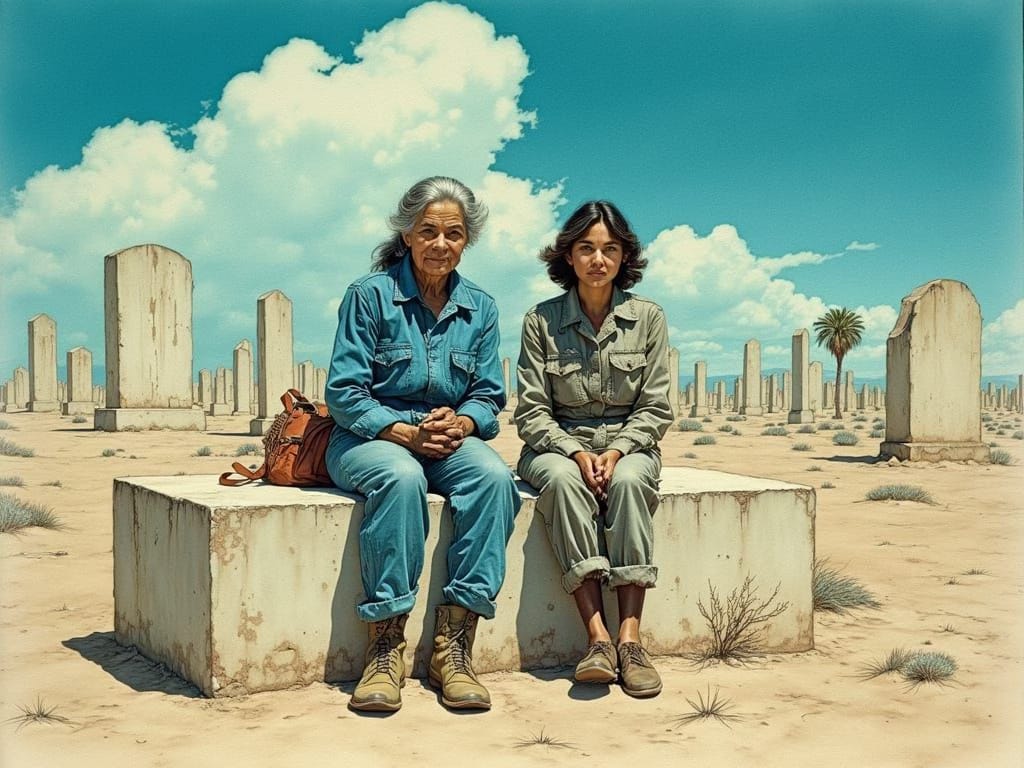Safiya is in Landing for the first time in years. She sits with her mother on a white bench. Twenty meters away is a fresh pile of turned-up regolith, and a headstone. She sits with her hands limp and loose on her knees. Her mother is dabbing a handkerchief at her eyes.
Safiya can read the stone from there. Halid, and his last name. The meaningless dates of birth and death, that hundred and fifteen years of sleep spreading his life out to two centuries. His men’s group had added his name in graceful Arabic letters underneath. “Which is pointless,” Nadzwa says, “since almost no one can read it now. Least of all him, not like he ever could.”
“He could. Once,” Safiya says.
“Pfft.” Nadzwa wiped her eyes. “Do you believe in Allah, Safiya?”
“Sure, mom.”
“No, really, do you?”
Safiya shrugs. “There’d no God, mom. No one believes in that stuff anymore.”
Nadzwa sits there. She’s hunched over, potbellied, and old. Safiya remembers her as impossibly tall and lovely, dark, with oceans of black hair. It’s all gray now, and she wears old-fashioned coveralls which she sews herself, even now. She picked up the habit when Safiya was just a baby, when the old coveralls were wearing down to their last thread, and the council cut shop-made clothing rations for the third time in three years.
“I believe,” Nadzwa said. She’s switched to Tausug. The rust flakes off the words, and they grind painfully in her mouth. Who else but she and Safiya speak it now?
“I know, Mom.”
“Your father believed.”
“Mom.” She sighs. “Everyone knows how the universe works.”
“Be respectful.”
“Yes, Mom.”
“How’s Ĉaŭŝo?”
“He’s fine.” Safiya had already told her. “He couldn’t come. He’s overseeing the new wells north of Helioshad. They found a lot of water.”
“Water’s a gift,” her mother mumbles. She puts her face in her hands, “What will I do without him?”
Safiya looks at the sky. It’s a clear day. The sky is a lovely color that one of the Americano kids had called robin’s-egg, a long time ago when Safiya could ride on her father’s shoulders. The sun is pale yellow-orange and hot. Tonight, it will be cold because summer is waning.
“I wish I’d been here,” she says. “It’s a long way from Helioshad.”
“I told you he wasn’t well.”
“I know.”
The pile of regolith is fresh and bright. His men’s group had the burial right away for him, as was right. Hardly anyone had come.
“People have to work in the middle of the week, Mom.”
“You think they’d make time.”
“His friends were here.”
“All five of them,” she said, severe.
Safiya looks at the little cemetery. Not so little. She looks again. It was getting bigger. People died building a world. So many dead the first twenty years, fewer the next, now more, and more. Old people born under a paler sun, under a bluer sky, on, or around, a world that knew them just a bit better.
Iphigenia would never love them like Earth. She was an uncomfortable new friend who wasn’t sure why they were there. Odd soils, silent, disapproving plants. Pensive seas with chains of dead, dusty islands. Welcome to my house. Sit down. I wasn’t ready to see anyone today. How are you?
A little girl comes with her mom. The patter of the new language is on her lisping lips, the pronunciation not quite what Safiya thinks is correct, but the children’s children had made the tongue their own, minted new words, thought in terms of it. There’s another grave, older by a few months. "Rigardu, jen’la tombo d’avo!" Look, there’s grandpa’s grave!
Her mom is young, sleek, black-haired, black-eyed. Youngest daughter, probably. Dutiful she cleans the grave. Safiya’s hands tell her she should imitate her, but she’s embarrassed, and the grave’s new. And mom is leaning against her.
The little girl is laying flowers on the foot of the stone, and some seashells, in a particular order, with a sing-song, lilting verse that Safiya can’t hear.
“Silly, where’d you hear that?” her young mother says.
“Don’t know, mama. Apple tree, apple tree, lady’s hand on th’apple tree, lady of th’sea—”
Safiya thinks about her father. About riding up on his shoulders.
“Let me ride on your head, dada! Let me ride on your head!”
He carried her, he carried her, all the way, until she finally got down and ran on her own. Ran, and never turned to look back.





